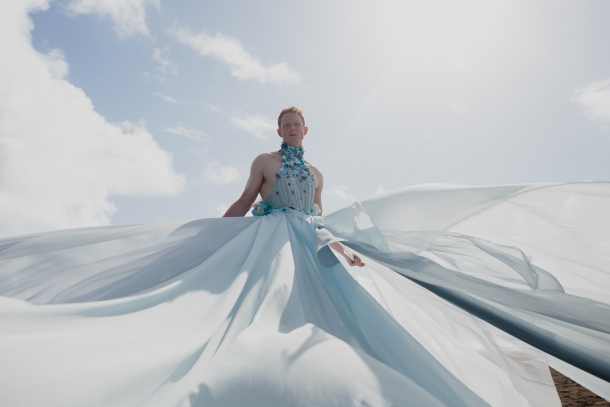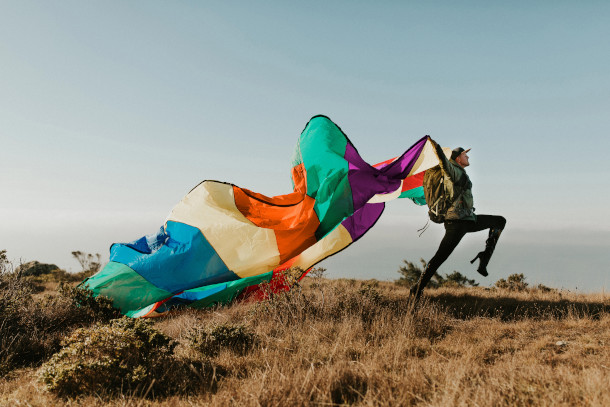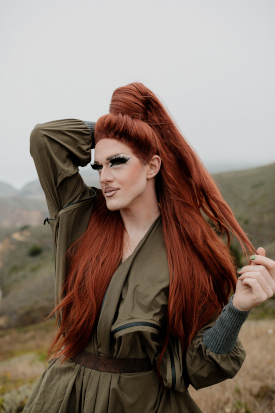Hiking in 6-Inch Heels
Air Date: Week of October 23, 2020

Pattie Gonia on a beach in Hawaii. (Photo: Courtesy of Pattie Gonia)
Growing up as a queer person, photographer Wyn Wiley was often told: The great outdoors is for everybody, but only if you look and act a certain way. Now, he works to break down this barrier. His drag queen alter-ego, Pattie Gonia, hikes in 6-inch heels and a full face of makeup, preaching on Instagram that enjoying the outdoors transcends gender identity and sexual orientation. Wyn Wiley speaks with Bobby Bascomb as Pattie to discuss her journey as a queer environmental activist and the solace she finds in nature.
Transcript
BASCOMB: The great outdoors is wild, rugged, and often cast in masculine terms. So, it can be easy for queer and gender non-conforming people to feel excluded from outdoor spaces. But photographer Wyn Wiley wants to change that. Wyn spends his spare time hiking in the back country as Pattie Gonia, a drag queen complete with wigs, exaggerated makeup and six inch heels. Pattie posts pictures of herself on Instagram to encourage everybody, regardless of gender identity and sexual orientation, to get out and enjoy nature. She has amassed some 300,000 followers on Instagram and joins us now, in those 6 inch heels, to discuss her journey as a queer environmental activist and the solace she finds in nature. Pattie Gonia, welcome to Living on Earth.
PATTIE GONIA: Thank you for having me. I'm excited.
BASCOMB: Yeah, we're so excited to have you. Growing up in Nebraska. What was your relationship like with the environment, with the natural world around you?
PATTIE GONIA: Yeah. Growing up in Nebraska, I had nature all around me, I lived my life, my grandma's farm and in my backyard. And there's no more vivid memory of childhood than like the giant oak tree in my backyard and the swing attached the oak tree. And I also spent a lot of time growing up in Boy Scouts and that brought me outdoors as well.
BASCOMB: Now today, you're putting together your love of nature and your expression of yourself through drag. Can you tell us about that, about hiking outdoors in full drag regalia? What does that look like? And how does it feel for you?
Wyn created Pattie Gonia two years ago and has accumulated over 300,000 follows on the account’s Instagram page. (Photo: Courtesy of Pattie Gonia)
PATTIE GONIA: I feel very lucky that my passions get to intersect so much. I really feel like for anyone in life when you can get a chance to intersect your passions, and kind of Venn diagram one circle over the other and find that middle, ooey gooey like good zone, it's so wonderful. I feel so alive. So when I do drag in the outdoors I feel the most me. And yes, that means literally backpacking in high heels, which you can think is a very silly and stupid and dangerous thing but so is riding a mountain bike down a mountain at 45 miles an hour. So you know pick and choose your danger in the outdoors. I just choose to wear some six inch heels, but it's really beautiful for me to get to also be very feminine and be in touch with my femininity and a space I feel is very feminine. And I feel like we're told through media, through just the narratives and through the archetypes in the outdoors that the outdoors are a very masculine space. They're very, they're there to conquer, and I enjoy being with them, and I enjoy making art with them. It totally changes my experience with the outdoors when I'm in drag as well. I feel like I noticed things I wouldn't out of drag.
BASCOMB: Really like what
PATTIE GONIA: You know when you sit and you do your makeup for three hours and you're in one place, you just notice a lot of things. You notice the birds. You notice the flowers around you, I think I spent so much of my life, especially pre quarantine going at such a fast pace. And I think when you're out on the trail you also can go such a fast pace even though you're walking, you know, you're you're going by so much so fast. And I feel like when I'm sitting there, I can just notice what's actually around me and can realize how much of a, how much of like a symphony at all is how much everything has a purpose, myself too.
BASCOMB: And what inspired you to start doing drag to begin with?
PATTIE GONIA: I think what inspired me to do drag was finally wanting to do it for myself. I grew up in Nebraska, in an incredibly beautiful environment, but one that basically was told to me only accepted me if I was straight passing. So when I came out, it was conditional love. It was, hey, we love you. This is beautiful. We accept you for who you are, but never do drag but never want to transition to be a female. But never, this never that. Don't change your voice. Don't don't have a feminine voice. So I think drag for me was the release of kind of a lot of toxicity that I'd internalized since initially coming out. And just falling in love more and more with drag ever since. I'm fascinated with the freedom that I feel when I'm a drag.
Many of Pattie’s looks, like this one, are inspired by animals, plants, and the great outdoors. (Photo: Courtesy of Pattie Gonia)
BASCOMB: And so for someone that hasn't seen your Instagram posts, can you describe a typical outfit that you might wear on the trail or even a favorite outfit that you've worn that would really give people an image in their mind?
PATTIE GONIA: Absolutely. So I just want you to think of the most absolutely absurd things you could ever imagine a drag queen to wear and that's literally what I'm wearing. So one of my favorite outfits is actually made by one of my friends, Angela, and the dress is actually a full functioning tent. You can take off the dress, you can literally put poles in it and it turns into a tent. I'm not kidding. So she originally designed it as a jacket that was used to basically bring up the conversation of refugees. So she's made hundreds of these coats to give to refugees to be able to have as jackets slash coats and also as tents that they can sleep in as well. But we're repurposing it for the outdoors as well. So it's fun. I think it's definitely fun to just have fun with fashion to not take it too seriously. Some of my favorite looks are things I throw together like that. And or I have a piece that I want to show and tell with you that I want to describe for listeners.
BASCOMB: That'd be great.
PATTIE GONIA: So so this is a wig made of over 100 pieces of plastic.
BASCOMB: Woah, looks like a giant disco ball of plastic.
PATTIE GONIA: Yes, it is very, I think very like Amadeus. Like, like very much queen, old royalty, like can we create a two foot tall wig on a head? Yes, we can. And let's do that of plastic. So this is all differently like upcycled plastic items. And I'm going to set the phone number so I can put on and then I'll pick up the phone again. So give me one second.

Pattie showing off her six-inch heels. (Photo: Courtesy of Pattie Gonia)
BASCOMB: Perfect yeah.
PATTIE GONIA: Okay, just so you can see the full effect.
BASCOMB: Perfectly I love it.
PATTIE GONIA: Okay, so this is it. It literally looks like I am wearing just a giant stacked pile of trash on my head because I am.
BASCOMB: Well it looks very, you know, Marie Antoinette to me, you know, like back in that era, there was so over the top with things like that weren't even trying to look real.
PATTIE GONIA: Absolutely. And it's great it like, ruffles in the wind, like you can kind of hear it. We'll do some ASMR. Something I'm thinking about all the time is that drag as a culture is inherently very wasteful. And I'm really trying to deconstruct drag for the purpose of making it as sustainable as can be. So this is a wig made of plastic because plastic wigs you see drag queens wear that look like real hair are literally plastic. So why am I putting new plastic into the world rather than wearing trash? So I am a trashy queen? Here I am.
BASCOMB: Love it.
PATTIE GONIA: So I'm gonna take this off because it's gonna be like audio interference. But yeah.
BASCOMB: It doesn't look too comfortable, either.
PATTIE GONIA: It's actually really comfortable. It's -
BASCOMB: Really?
PATTIE GONIA: One of my most comfortable wigs. Yeah, it's amazing.
Pattie’s short film, Dear Mother Nature about being herself in the outdoors was nominated for several awards. (Photo: Courtesy of Pattie Gonia)
BASCOMB: Yeah, super fun. And what kind of reactions do you get from other people on the trail that are probably not expecting to run into a drag queen? Well, you know, out and about in the woods?
PATTIE GONIA: Absolutely. Um, it's always a mixed bag. I'm fascinated with how much even just wearing heels even if they're not in for drag, but just hiking in heels, is such a disarming moment, like people will, it'll catch them off guard and notice the heels and they'll light up inside and they're like, oh my gosh, hi. Whoa. And it's always a conversation starter. Of course. It's not like you see people walking in six inch heels out in nature. But I think it's a really beautiful touch point to learn. And I love opening up conversation with people if they're open to it on the trail, but I've definitely had an experience homophobia on the trail, too. I've definitely not felt comfortable at many points on the trail, especially when I'm more in full form drag, have been called a circus act on the trail. I've been called other words, we will not say on public radio, so it's a mixed bag. But I'm amazed at how often it's a positive interaction.
BASCOMB: You know, we've had a few segments on Living on Earth recently about people of color, enjoying the outdoors, and I'm sure you're familiar with the story of Christian Cooper, the African American man who was birding in Central Park when a white woman called the police on him after he asked her to leash her dog. You know, people of color routinely report feeling unsafe or unwelcome in the outdoors. How does that sentiment resonate with you as a queer person, as a drag queen?
PATTIE GONIA: Absolutely. I think the practice of drag really lets me know that the hate that I face and the homophobia that I face is a sliver of what people of color experience, is a sliver of what my trans and non binary queer community members experience on the trail. It's a very different experience in a very privileged experience that underneath drag, I am a white, straight-passing male. And that's something I'm thinking about all the time. And thinking about how much drag really lets my queerness unfold. But the privilege it is to be able to wipe off makeup at the end of the day, the privilege to be able to pack away my heels and have no one know about my difference or about that I'm a member of a marginalized community. So I think it's a really, really interesting practice. And I'm not at all comparing my experience to theirs, but it literally does very much let me know how much work we have to do in the outdoors to truly make them an inclusive place for everybody.
BASCOMB: And why do you think it's important to see queer people in the outdoors?

Pattie describes herself as an intersectional environmentalist. (Photo: Courtesy of Pattie Gonia)
PATTIE GONIA: I think it's important to see queer people in the outdoors, because nature is so queer itself. Because queer people are people too. Because if the outdoors can't be a place where we celebrate diversity, something that Mother Nature knows is absolutely key. For the longest time, I didn't see myself represented in the queer community because I'm not a person that's going to spend their Friday or Saturday night in a bar club. And I'm not dogging that. I'm just saying, I'm going to be out on the trail. I'm gonna be out camping. And so I've been really thankful for this journey with Pattie to really remind me how much we can create queer community in the outdoors and how important that is and how many queer people were already out there in the outdoors. We just didn't have as many campfires to kind of gather around.
BASCOMB:Wynn Wildly is Pattie Gonia intersectional environmentalist and self described photos drag queen. Thank you so much for taking this time with me and sharing your story.
PATTIE GONIA:Thank you so much for letting one of my baby steps of being a drag queen be being on your show.
Links
Living on Earth wants to hear from you!
Living on Earth
62 Calef Highway, Suite 212
Lee, NH 03861
Telephone: 617-287-4121
E-mail: comments@loe.org
Newsletter [Click here]
Donate to Living on Earth!
Living on Earth is an independent media program and relies entirely on contributions from listeners and institutions supporting public service. Please donate now to preserve an independent environmental voice.
NewsletterLiving on Earth offers a weekly delivery of the show's rundown to your mailbox. Sign up for our newsletter today!
 Sailors For The Sea: Be the change you want to sea.
Sailors For The Sea: Be the change you want to sea.
 The Grantham Foundation for the Protection of the Environment: Committed to protecting and improving the health of the global environment.
The Grantham Foundation for the Protection of the Environment: Committed to protecting and improving the health of the global environment.
 Contribute to Living on Earth and receive, as our gift to you, an archival print of one of Mark Seth Lender's extraordinary wildlife photographs. Follow the link to see Mark's current collection of photographs.
Contribute to Living on Earth and receive, as our gift to you, an archival print of one of Mark Seth Lender's extraordinary wildlife photographs. Follow the link to see Mark's current collection of photographs.
 Buy a signed copy of Mark Seth Lender's book Smeagull the Seagull & support Living on Earth
Buy a signed copy of Mark Seth Lender's book Smeagull the Seagull & support Living on Earth

